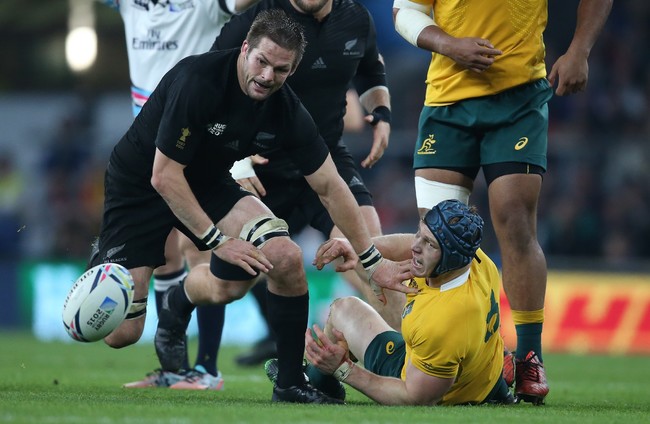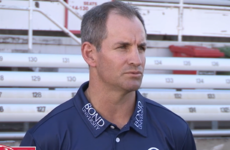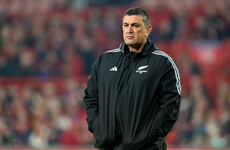“I HAVEN’T MISSED being stiff and sore on Sunday mornings,” said Richie McCaw as he prepared to make his comeback from a self-imposed sabbatical in 2013.
McCaw’s case has been the bad penny, continuously turning up while we’ve been rummaging around in search of positives for athletes during the ongoing absence of sport amid the Covid-19 crisis.
The All Black captain looked like a man eking the last droplets of willful energy from his body as he helped New Zealand win the World Cup on home soil in 2011. Four years on, he was in better nick, unburdened now by a foot injury, when he repeated the achievement in Twickenham.
The common consensus is that the six-month stint away from rugby served to replenish McCaw’s powers enough to bow out with that second Webb Ellis on the table in 2015.
Dan Carter wore the black jersey for the last time on the same night in London having also exercised a clause in his NZRU contract to take six months off. The captain in opposition, David Pocock, then took time away from the game in 2017.
In sportswriting, we may routinely refer to a player’s miles on the clock, the mounting toll on an athlete’s body is not so easy to measure as the odometer on their cars.
“People say it must be great, you must be feeling good, well, I don’t actually feel that different,” McCaw said in an interview with Otago Daily Times before his return.
While it’s hard to avoid the assumption that there must a boost to be taken from the absence of numerous body-on-body collisions week after week, the Coronavirus pandemic presents a different set of circumstances for players and athletes.
There is not yet anything like clarity over how long social distancing will have to be sustained. So there is no finish line in sight for when life, never mind sport, will get back to normal. The current crop cannot relax on the comfort of anything resembling concrete timeline.
It may feel like an age, but tomorrow marks five weeks since Ireland’s elite rugby players last took to the field and suffered another dispiriting defeat to England. The provinces (bar Ulster who were scheduled to visit northern Italy) played a week later. So even amid all the necessary disruption, professional players on this island remain a long, long way shy of the six-month reprieve taken by the trio of 2015 World Cup finalists.
Physically, a break in play would absolutely have value when viewed as a part of the season as a whole: after pre-season began in June, Tests began in August and the draining World Cup season was then set to run right through to Ireland’s tour of Australia in July.
Recovery for athletes is an ongoing process between taxing sessions and events. Though their peers in other nations are often expected to wear their boots week in, week out for the full extent of a season with club and country. Rugby players in the Irish system are continually assessed, monitored and managed with rest windows built in. The same management will apply, imposing rest windows if and when an intense series of fixture catch-up is to be played.
To walk into a bar or restaurant and for no one to give you a second look was actually really nice,” said McCaw, summing up his refreshed feeling after his hiatus, “after a while the constant stuff here got on top of you. But you come back and you realise it’s not that big a deal at all, really.”
There can be major mental benefits to this break for rugby players, particularly after a disappointing World Cup. However, as we touched on in these pages last week, social distancing presents its fair share of challenges for athletes. Irish rugby players are figuring out ways to entertain cooped-up kids, sustain a work-out routine and team unity withou proximity. McCaw’s time away saw him travel to the US, catch up with friends, take in a David Letterman show and go skiing.
Pocock used most of his time to join up with an anti-poaching group in his native Zimbabwe and showcased some ingenious ways of getting a workout done with a rope acting as the most state of the art equipment on show.
Carter, who was somewhat unfairly said to have taken a sabbatical when he signed for Perpignan in 2008, used his time in 2014 to follow McCaw’s path to the US, though his scene was more Coachella. There will be no such grand tours for players here, no matter how long the restrictions are in place.
And while the break away may well be timely for experienced players, giving them a break from the treadmill – metaphorically if not physically, stopping the odometer in the final third of their career, there must be a danger that development for younger stars may also slow.
For every trial for the individual then, there are multiple complications when attempting to slot them back within a team. Pocock and the Kiwis then had the benefit of returning to sides who had remained ticking over throughout their absence. Rugby teams in the current climate will have to effectively begin their season anew whether the fixtures before them are at the business end of 2019/20 or not.
Some players who were struggling with injury will take solace in the fact that they are not missing out on big matches. But when they resume training their fit and well team-mates will be working up from a similar base and it will be intriguing to see which sides settle back into cohesive patterns of play quickest.
Or, indeed, if they alter their gameplans to accommodate any rust accumulated during the shutdown.
There’s no fun to be found in waking with a stiff and sore body every weekend, but players will be forgiven for missing the reassuring familiarity of it.













Makes it more difficult for me to do the double win but not impossible.
@T Dawg: I have every faith in you.
@T Dawg: plenty of practice time now anyway